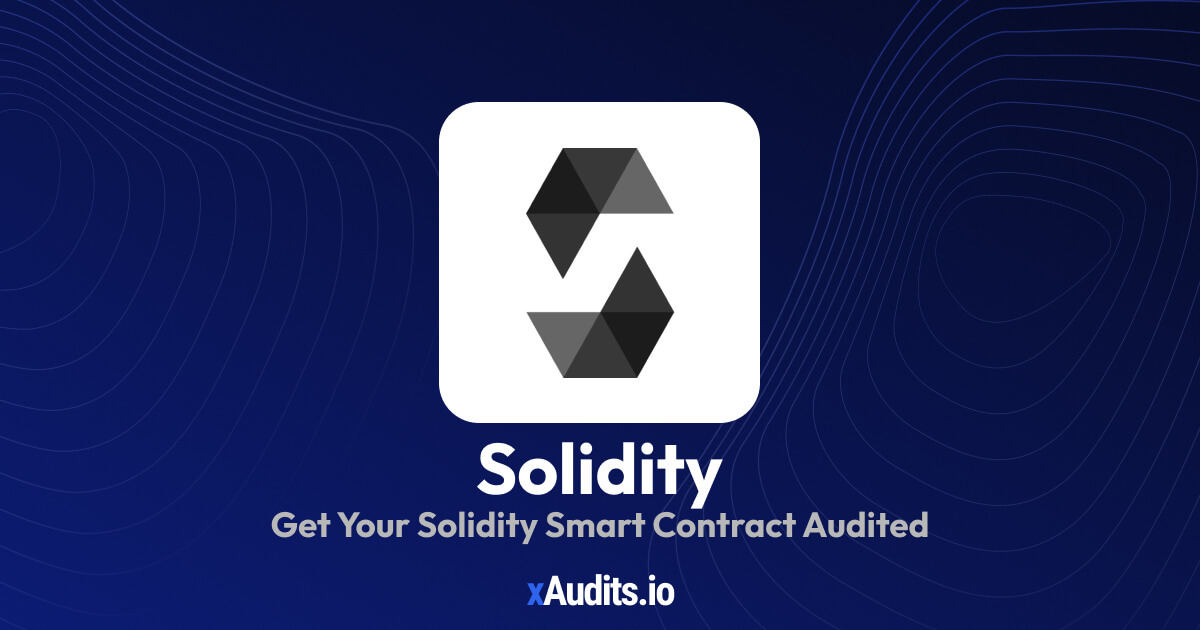Solidity Smart Contract Audit

Now that the pace of blockchain and decentralized finance (DeFi) is accelerating with new startups launching daily, the field has become a hive of activity. To date, smart contracts written in Solidity are the go-to option for DeFi. Smart contracts function as self-executing contracts where the contract conditions are embedded in code.
Even though these contracts would allow automation, and bring in transparency, the fact that they can be on-natively tampered with also introduces a factor that would be a matter of concern for every new user of this system. Solidity Smart Contract Audit services can help to prevent this from happening.
The Rise of DeFi
Decentralized Finance (‘DeFi’) has replaced centralized banking services with decentralized counterparts, ultimately offering users lending and borrowing services, decentralized exchanges, yield farming and more. Infrastructures for the above are typically established via the use of smart contracts which utilize blockchain technology with a strong focus on security.
Solidity: The Language of Smart Contracts
Ethereum, the primary blockchain platform used by DeFi, developed its own language called Solidity to write smart contracts: a high-level language meant to allow developers to write smart contracts in a way that is easy to understand and guarantees high-security standards. But this high-level advanced language does not come without it's own idiosyncrasies and pitfalls.
Challenges in Solidity Smart Contracts
The actual process of writing secure smart contracts in Solidity is deceptively complex, as it requires a higher level of familiarity with the language’s intricacies than one might think. Common security vulnerabilities include reentrancy attacks (function calls going back to a contract and bypassing attempted defensive measures), integer overflow/underflow (a form of tampering with the state via maliciously crafted transactions with sufficiently large integer values), and insufficient access control (where various states can be manipulated by a specific attacker if by chance they are able to interact with the contract). Even seasoned developers might still accidentally slip vulnerabilities into their codes, making carefully conducted smart contract audits imperative before any given smart contract is deployed into a production environment.
The Role of Solidity Smart Contract Audit Services
A Solidity Smart Contract Audit is generally performed by experienced auditors that specializes in blockchain security and smart contract development using a systematic approach to assess its security, functionality and compliance. This includes determining the technical viability of the smart contract, identifying any potential security vulnerabilities, and suggesting remediation strategies.
Key Aspects of Solidity Smart Contract Audits
Code Review
The expert auditors examine the smart contract source code, performing various automated tests and line by line manual review of the smart contract's code to spot potential vulnerabilities, and make sure it constantly follows best practices and industry standards.
Security Best Practices
This process involves verifying that the solidity code follows best practices for security, including input validation, data storage, and resistance against common attack vectors.
Functionality and Logic Review
The audit checks that what the smart contract is supposed to do will indeed happen. The audit team reads over the smart contract's code to make sure that no unintended consequences have been programmed in, therefore eliminating logical errors.
Gas Optimization
A smart contract auditor also looks at gas optimization as one aspect of computational resource usage on the blockchain that, if minimized, will decrease the transaction cost for users.
Compliance
The auditing services provider then checks that the smart contract adheres to the relevant laws and regulations, thereby curbing the hazard of regulatory scrutiny.
Benefits of Solidity Smart Contract Audits
Risk Mitigation
Identifying potential vulnerabilities and addressing them before deployment minimizes the risk of exploitation by malicious actors.
Enhanced Trust
Third-party smart contract auditing can enhance the project's team trustworthiness in the eyes of users and investors alike.
Regulatory Compliance
This step ensures adherence to regulatory standards, reducing the likelihood of legal complications.
Improved Reputation
Platforms that prioritize security through audits are viewed more favorably by the community, leading to a positive perception of the project's reputation.
Elevate Your DeFi Platform's Security with xAudits Solidity Smart Contract Audit Services!
Security is of paramount importance, particularly in the ever-evolving environment of DeFi, and we are dedicated to grabbing that very concept by the throat in order to quash all forms of vulnerability that could possibly threaten your platform. By performing full end-to-end manual security code audits of your contract, we zero in on every possible vulnerability, preventing not just a major blow to your platform but also to the overall reputation of decentralized finance. But due to our industry-leading, all-inclusive proactive audits, performed by our seasoned experts, xAudits will provide exclusive protection against every DeFi threat present and future.
Choose xAudits to secure your future, inspire confidence, and lead in DeFi security – because in this rapidly evolving landscape, security should never be an afterthought!